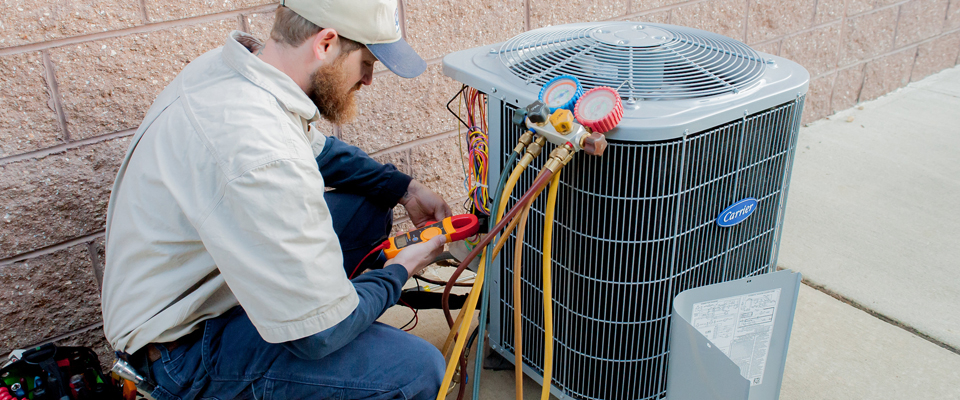Energy-Efficient Heating And Cooling Systems to Minimize Energy Bills
As energy expenses continue to increase, the relevance of energy-efficient A/c systems ends up being progressively apparent. These systems not only assure considerable financial savings on energy costs however likewise contribute to an extra sustainable future by reducing energy intake.
Benefits of Energy-Efficient HVAC Equipments
Energy-efficient a/c systems supply countless advantages that extend beyond simple expense savings. One significant advantage is the reduced environmental impact. By consuming less power, these systems contribute to lower greenhouse gas emissions, helping to battle climate adjustment and promote sustainability. This straightens with enhancing social needs for environment-friendly methods in household and industrial setups.
Furthermore, energy-efficient heating and cooling systems often offer enhanced convenience degrees. Much of these systems feature sophisticated technology that enables much better temperature control and enhanced air top quality (DMAKS HVAC). This results in a much healthier indoor setting, which is especially important for individuals with allergies or respiratory issues
Additionally, purchasing energy-efficient cooling and heating systems can boost home worth. As even more consumers prioritize energy efficiency, homes and buildings outfitted with these systems might bring in greater bids in the actual estate market.
Types of Energy-Efficient Heating And Cooling Options
Exactly how can homeowners and services choose one of the most ideal energy-efficient heating and cooling alternatives for their needs? The marketplace supplies a selection of energy-efficient HVAC systems, each developed to improve comfort while reducing energy intake.
One alternative is the variable refrigerant flow (VRF) system, which successfully controls the temperature level in multiple zones within a structure. This system adjusts its refrigerant flow to match the wanted temperature level, causing considerable energy cost savings.
One more preferred selection is geothermal warmth pumps, which utilize the planet's secure temperature level to heat and great spaces. By transferring heat to and from the ground, these systems show outstanding performance, specifically in moderate environments.
Additionally, ductless mini-split systems provide an energy-efficient choice for homes lacking ductwork. These systems allow for zone-specific cooling and heating, decreasing power waste in vacant areas.
Lastly, high-efficiency heating systems and air conditioning unit, with innovative SEER and AFUE ratings, use trustworthy climate control while consuming much less power than traditional designs. By examining these options, homeowners and companies can pick a HVAC system tailored to their particular requirements and power performance goals.
Key Features to Think About

Following, check out the sort of compressor used in the system. DMAKS HVAC. Variable-speed compressors can adjust their result to match the heating or cooling need, leading to enhanced comfort and power financial savings contrasted to single-speed versions. Additionally, search for systems furnished with wise thermostats that use programmable settings and remote gain access to, permitting much better control over energy consumption
An additional crucial attribute is the system's air purification capacity. High-efficiency filters can enhance indoor air high quality and minimize energy consumption by ensuring the system operates successfully. In addition, think about the sort of cooling agent used; contemporary systems frequently employ green refrigerants that have a lower environmental effect.
Lastly, make sure that the system works with zoning technology, which permits tailored temperature level control in various areas of your home, enhancing convenience while lessening power use.
Tips for Choosing the Right System


Following, consider power efficiency scores, specifically the Seasonal Energy Efficiency Ratio (SEER) for cooling down systems and the Yearly Gas Application Performance (AFUE) for heating unit. Higher ratings show better performance, which can lead to significant financial savings on utility costs in investigate this site time.
Furthermore, review the type of cooling and heating system that finest fits your way of living and budget. Options consist of main air conditioning, ductless mini-splits, and heat pumps, each with its own collection of benefits and downsides.
Don't ignore the relevance of correct installation and sizing; an improperly sized system can result in inadequacies and increased wear. Lastly, seek advice from an expert heating and cooling contractor to get experienced suggestions customized to your home's unique requirements. This extensive strategy will make sure that you select an energy-efficient HVAC system that meets your demands and budget efficiently.
Maintenance for Optimum Effectiveness
Once the best a/c system remains in place, continuous maintenance becomes key to ensuring optimal performance and longevity. A well-kept system runs better, leading to reduced power intake and minimized utility expenses. Regular inspections and tune-ups ought to be set up at least twice a year-- once prior to the air conditioning period and as soon as before the heating season.

House owners ought to also be watchful about monitoring their heating and cooling system's efficiency. Uncommon sounds, varying temperatures, or raised energy bills can suggest underlying issues that call for prompt focus. By addressing these see problems immediately, house owners can avoid pricey repair services and expand the lifespan of their systems.
Buying an upkeep plan with a qualified technician not just enhances effectiveness but likewise supplies peace of mind, recognizing that the system is operating at its ideal. DMAKS HVAC. Normal maintenance is therefore crucial for maintaining power effectiveness and lowering total functional expenses
Conclusion
To conclude, energy-efficient HVAC systems offer a viable remedy for minimizing utility bills while enhancing comfort and air high quality. By including sophisticated modern technologies and options such as geothermal heatpump and ductless mini-splits, property proprietors can achieve considerable power financial savings and add my company to environmental sustainability. Mindful consideration of system features and recurring upkeep even more makes certain ideal performance, making energy-efficient systems a sensible financial investment for both financial and environmental advantages.